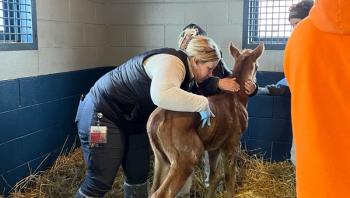
AVMA, FBR unite to tell benefits of research on lab animals to veterinary medicine
PHILADELPHIA-The Foundation for Biomedical Research (FBR) and the American Veterinary Medical Association (AVMA) unveiled a collaborative union to promote the merits of laboratory animal research.
PHILADELPHIA—The Foundation for Biomedical Research (FBR) and the American Veterinary Medical Association (AVMA) unveiled a collaborative union to promote the merits of laboratory animal research.
The need is great for continuation of lab animal research, says Frankie Trull, FBR president.
"The goal is to promote public respect and appreciation for biomedical research involving lab animals," she says. "Research plays a key role in advancing veterinary medicine as well as human medicine."
Theresa Fossum, DVM, Ph.D., and Bonnie Beaver, DVM, AVMA president, say medical research conducted on animals advances lives of pets and increases capabilities available in veterinary medicine.
Dr. Bonnie Beaver, AVMA president, says advances in treating ailments—such as heartworm disease and cancer, arthritis and other problems veterinarians see on a regular basis—can be attributed to research on laboratory animals.
"Fifteen years ago, 32 percent of owned dogs lived past the age of 6; today, 49.7 percent live past the age of 6." Beaver says. "This can be attributed, in part, to the knowledge gained and applied through research."
Paul Silva, a 9-year-old, cancer-surviving Golden Retriever named T.J., spoke in favor of utilizing research found in laboratory animals.
"T.J. underwent a series of four radiation treatments, something unheard of for dogs not long ago," Silva says.
T.J., a cancer survivor, graces AVMA attendees at the FBR meeting in Philadelphia. His owner, Paul Silva, was among the speakers.
Activists denounce work laboratory animals do for pets, Trull says.
"Campaigning against medical research on animals decreases the ability to treat animals with owners,"she says.
July 14 kicked off a bus and subway campaign, advertising animals that have benefited from laboratory research and allowed for advances in veterinary medicine.
Dr. B. Taylor Bennett, associate vice chancellor for research resources, University of Illinois at Chicago, says in the years he has worked as a laboratory veterinarian, he has seen the benefits of using laboratory animals and the the variety of platforms in which research serves, including helping other animals.
Trull says progress in the management of canine hip dysplasia, non steroidal anti-inflammatory drugs and feline diabetes are among the ways research has advanced pets' healthcare.
Theresa Fossum, DVM, Ph.D., official spokesperson for the foundation, professor of small animal medicine and surgery at Texas A &M University's College of Veterinary Medicine, says she promotes the use of lab animals to benefit veterinary medicine. She recently performed one of the first successful open-heart bypass surgeries using a new surgical technique.
Newsletter
From exam room tips to practice management insights, get trusted veterinary news delivered straight to your inbox—subscribe to dvm360.




